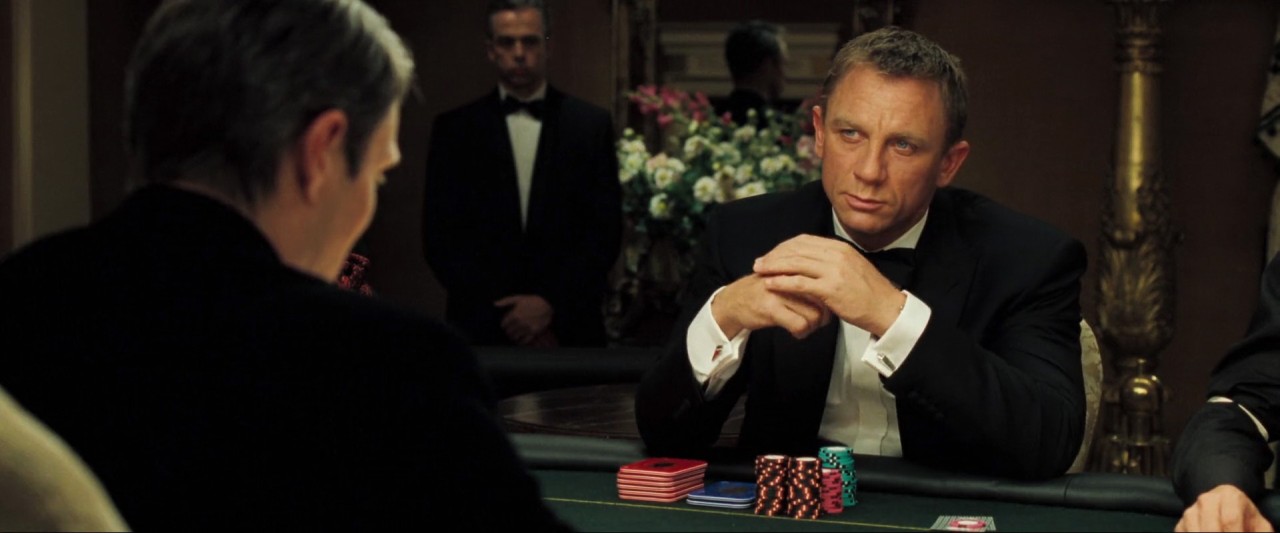🎬 Casino Royale (2006)
Casino Royale | 2006 | Starring Daniel Craig, Eva Green, Mads Mikkelsen, Judi Dench
Review:
Casino Royale, directed by Martin Campbell, is a reinvention of the James Bond franchise, introducing Daniel Craig in his first outing as the iconic British secret agent. Released in 2006, the film serves as a prequel, exploring Bond’s origins and the events that shaped him into the suave yet hardened 007 audiences have come to know. Based on Ian Fleming’s first Bond novel, the movie is a gripping blend of action, intrigue, and emotional depth, revitalizing the series for a new generation.
A New Era for Bond
From its opening moments, Casino Royale establishes itself as a departure from the traditional Bond formula. Gone are the over-the-top gadgets and campy humor of earlier installments. Instead, the film delivers a grounded and gritty narrative that emphasizes character development and realism. The black-and-white pre-title sequence, showcasing Bond earning his 00-status with two brutal kills, sets the tone for the entire movie—a story that is as much about the man behind the tuxedo as it is about the missions he undertakes.
Daniel Craig’s portrayal of James Bond is a revelation. Initially met with skepticism, Craig quickly silenced critics with his rugged physicality, emotional vulnerability, and undeniable charisma. His Bond is a raw and unpolished agent, prone to making mistakes and struggling to balance his duty with his humanity. This complexity adds layers to a character that had often been depicted as an unflappable archetype.
The Plot: High Stakes and Deception
The central narrative of Casino Royale revolves around Bond’s mission to bankrupt Le Chiffre (Mads Mikkelsen), a financier of global terrorism, in a high-stakes poker game at the titular casino in Montenegro. The plot masterfully weaves together action sequences, strategic mind games, and interpersonal drama, keeping the audience engaged throughout its runtime.
Le Chiffre is a formidable antagonist, portrayed with chilling intensity by Mads Mikkelsen. His bleeding eye and calm demeanor make him a memorable villain, while his vulnerabilities—desperation to recover lost funds—add a unique dimension to his character. Unlike traditional Bond villains, Le Chiffre is not a megalomaniac bent on world domination but a man cornered by his own bad decisions, making him more relatable and nuanced.
Eva Green’s Vesper Lynd is another standout. As the British Treasury agent assigned to oversee Bond’s spending during the poker game, Vesper is more than just a love interest. She is intelligent, witty, and fiercely independent, challenging Bond in ways that no other character has. The chemistry between Craig and Green is electric, culminating in a romance that feels genuine and deeply affecting. Vesper’s ultimate betrayal and tragic fate leave an indelible mark on Bond, shaping his distrustful and guarded nature in subsequent films.
Action and Pacing
Casino Royale delivers some of the most thrilling and well-choreographed action sequences in the franchise. The opening parkour chase through a construction site is a masterclass in kinetic energy and creative stunt work, showcasing Bond’s resourcefulness and tenacity. Later, a tense showdown at Miami International Airport keeps viewers on edge, blending suspense with explosive action.
The film’s centerpiece, however, is the poker game itself. Far from being a passive affair, the game is charged with tension, as each hand reveals layers of character strategy and psychological warfare. Director Martin Campbell uses clever cinematography and editing to make the game dynamic and engaging, even for viewers unfamiliar with the rules of Texas Hold’em. The stakes feel palpable, as Bond’s success or failure carries life-and-death consequences.
Themes and Emotional Depth
At its core, Casino Royale is a story about trust, betrayal, and the sacrifices required by duty. Bond’s relationship with Vesper serves as the emotional anchor of the film, humanizing the character and exposing his vulnerabilities. When Vesper’s true motives are revealed, Bond’s heartbreak is palpable, and his cold declaration, “The bitch is dead,” signals the birth of the hardened 007 audiences are familiar with.
The film also explores themes of identity and transformation. Bond’s journey from an impulsive, reckless agent to a calculating and emotionally distant operative mirrors his evolution into the classic James Bond persona. By the film’s end, he has embraced his role, fully embodying the line, “Bond, James Bond,” which is delivered with chilling confidence in the final scene.
Performances and Direction
The cast of Casino Royale delivers exceptional performances across the board. Daniel Craig redefines the character of Bond, combining physicality with emotional depth. Eva Green’s Vesper Lynd is one of the most memorable Bond women, her layered portrayal adding richness to the narrative. Mads Mikkelsen’s Le Chiffre is both menacing and human, a villain grounded in reality rather than caricature.
Judi Dench, reprising her role as M, serves as a maternal yet stern figure for Bond. Her dynamic with Craig’s Bond is sharp and compelling, filled with equal parts frustration and admiration. Dench’s performance adds gravitas to the film, grounding its more fantastical elements in emotional authenticity.
Martin Campbell’s direction is masterful. Having previously reinvigorated the franchise with GoldenEye (1995), Campbell once again breathes new life into Bond, balancing intense action with character-driven storytelling. The film’s pacing is deliberate yet never sluggish, allowing both the action and emotional beats to resonate.
Visuals and Music
The cinematography by Phil Meheux captures the film’s varied settings—from the sun-drenched beaches of the Bahamas to the sleek interiors of the casino—with elegance and style. The visuals enhance the film’s tone, blending grit with glamour.
David Arnold’s score complements the narrative, transitioning seamlessly between heart-pounding action tracks and more introspective themes. Chris Cornell’s theme song, “You Know My Name,” is a bold and energetic departure from traditional Bond ballads, perfectly encapsulating the film’s modern and edgy approach.
Reception and Legacy
Casino Royale was a critical and commercial success, earning over $600 million worldwide and revitalizing the Bond franchise. Critics praised its grounded tone, complex characters, and Daniel Craig’s performance, often citing it as one of the best Bond films ever made. The film’s success paved the way for future installments, cementing Craig as one of the most celebrated actors to don the iconic tuxedo.
The film’s influence extended beyond the Bond franchise, inspiring a wave of reboots and reimaginings that emphasized character depth and realism. It also redefined audience expectations for action films, blending high-octane sequences with thoughtful storytelling.
Conclusion
Casino Royale is a triumph of reinvention, stripping the Bond franchise of its excesses and returning it to its roots while introducing a modern sensibility. With its gripping narrative, stellar performances, and emotional depth, the film not only stands as one of the best entries in the series but also as a landmark achievement in action cinema. Daniel Craig’s debut as Bond is nothing short of iconic, setting the stage for a new era of 007 adventures.











